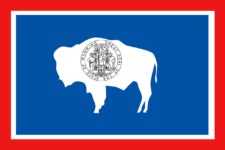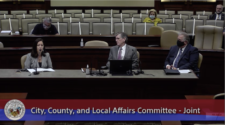 Many in the newspaper industry are wondering how public notice laws will fare in light of the fiscal crises precipitated in many states by the pandemic. Interim committee hearings last month in Wyoming and Arkansas suggest the answer may depend, at least in part, on the size and scale of each state’s budget deficit.
Many in the newspaper industry are wondering how public notice laws will fare in light of the fiscal crises precipitated in many states by the pandemic. Interim committee hearings last month in Wyoming and Arkansas suggest the answer may depend, at least in part, on the size and scale of each state’s budget deficit.
The Sept. 11 hearing in Cheyenne left Wyoming Press Association (WPA) Executive Director Darcie Hoffland in a state of heightened concern. By a 10-3 vote, the joint Corporations, Elections & Political Subdivisions Committee approved a motion to direct the Legislative Service Office to draft a bill that would move notices for meeting minutes and government-employee salaries from newspapers to local government websites. [CORRECTION: An earlier version of this story mistakenly stated the motion was “to introduce a bill next session” that would move the notices.]
According to Hoffland, some members of the committee who voted in favor of the motion had previously shown support for newspaper notice. Perhaps the most alarming development was the apparent change of heart by House Majority Whip Tyler Lindholm, R-Sundance, who voted in favor of the motion despite leading the fight to keep bid notices in newspapers earlier this year. (Lindholm lost his primary to a more conservative Republican and will no longer be a member of the legislature when it reconvenes for the 2021 session.)
Proponents of the motion focused squarely on the need to cut spending as a rationale for moving the notices to government websites. After noting her support of newspaper notice in the previous session, Rep. Shelly Duncan, R-Torrington said she no longer had that luxury as a result of the state’s budget hole. “We are in a budget crisis,” she said. “Everyway and anyway we can save we need to.”
How big is Wyoming’s deficit? Despite cutting $250 million from the state budget earlier this year, officials are still projecting a deficit in the current fiscal biennium of more than $1 billion. That’s the largest shortfall in Wyoming history and a significant chunk of money in a state that spent $4.7 billion in the previous fiscal year.
According to WPA board member and National Newspaper Association President Matt Adelman, the state’s extraordinary budget crisis is a result of both the pandemic and the collapse of the local oil, natural gas and coal industries. But he doesn’t think taking notices out of newspapers will save money. “It’s just a way for (the associations representing counties and municipalities) to justify killing newspaper notice, which is what they’ve wanted to do for years now, he says.
Adelman and Hoffland both say the notices at risk are significant, especially the one requiring publication of the minutes of city council and county commission meetings. Both suspect the elimination of that notice could force some of the smaller papers in the state to close.
Hoffland says newspapers in Wyoming have lost a number of notices over the last two decades and she expects the momentum to eliminate more to increase significantly in 2021. “It’s been death by a thousand cuts over the last 20 years,” she says. “A little bit here and a little bit there. We need to make a stand.”
The interim hearing held two weeks later in Arkansas’ House and Senate Committees on City, County and Local Affairs was far less threatening, at least in part because the fiscal picture is much brighter in the Razorback State than in Wyoming. Arkansas ended its latest fiscal year this summer with $360 million more than it expected to have after the pandemic arrived in full force in March.
It’s not that the cost issue didn’t come up, but there wasn’t a huge appetite in the room for making big changes to the notice laws.
Rep. Fran Cavenaugh, R-Walnut Ridge, focused on Arkansas’ lack of broadband access as a reason to proceed cautiously. “We’re in a transition period where it looks to me like we’re going to have to have multiple ways for people to get notices,” she said. “We’re still going to have to have print because we do have some areas where that’s the only way they’re going to get some notices.”
and two executives from Arkansas Democrat-Gazette parent WEHCO Media argued there is no need to move notices to government websites because APA already publishes them on its own statewide website. That argument proved to be persuasive for some members of the committee.
“I did not know [the press association had a public notice website] so I will be more than happy to work with you all in the future in regards to moving forward because I don’t think the state will need a website,” said Rep. Fred Love, D-Little Rock. Rep. Love had previously been in favor of creating a state government website for public notices.
Wimberley told the committees that APA would welcome an opportunity to participate in a legislative study about the future of public notice in the state. That is where this issue is likely to be headed.
